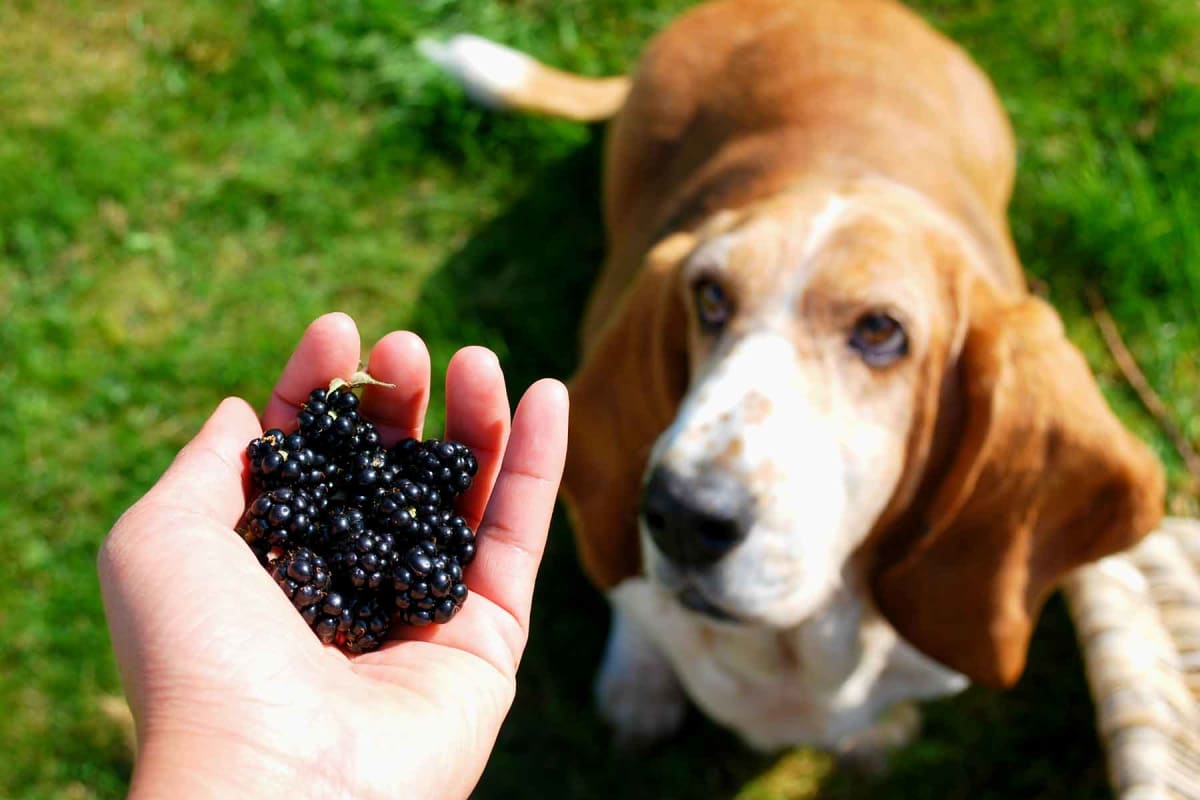
Can dogs eat blackberries?
Can dogs eat blackberries?
Can dogs have blackberries?
Yes, dogs can eat blackberries! Unlike some fruits that pose serious health risks to our four-legged friends, blackberries are non-toxic to dogs. These juicy berries make an excellent occasional treat that most dogs enjoy. Their small size and soft texture make them easy for dogs to eat without presenting a significant choking hazard.
What makes blackberries particularly appealing is that they're packed with nutrients while being relatively low in calories and sugar compared to many commercial dog treats. This makes them an excellent option for pet parents looking for healthier treat alternatives.
Are blackberries good for dogs?
Blackberries aren't just safe—they're actually beneficial for dogs in moderation. These little powerhouses are packed with vitamins, minerals, and antioxidants that can contribute to your dog's overall health and wellbeing.
Rich in antioxidants: Blackberries contain anthocyanins, which can help improve brain function, reduce inflammation, and potentially lower the risk of certain cancers.
High in fiber: The fiber content in blackberries can aid in digestion and help prevent constipation in dogs.
Low in calories: Blackberries are a great low-calorie treat option, especially for overweight dogs or those with health conditions requiring more diligent weight management.
Vitamin-packed: These berries provide vitamins A, B, C, E, and K, which support various aspects of canine health, including immunity, metabolism, heart health, and coat condition.
Omega-3 fatty acids: Blackberries contain omega-3s, which can help maintain a shiny coat and reduce inflammation.
Blackberries do contain trace amounts of natural xylitol—a sugar alcohol that's toxic to dogs in larger quantities. However, the minimal amount present in blackberries is not enough to cause concern when fed in moderation as part of a balanced diet.
When are blackberries bad for dogs?
While blackberries are generally safe, there are situations when they might not be the best choice for your furry friend:
Allergic reactions: Some dogs may have allergies or sensitivities to blackberries, resulting in symptoms like itchiness, swelling, or digestive issues.
Overconsumption: Too many blackberries can cause digestive upset, including diarrhea or stomach discomfort due to their fiber content.
Medical issues: Dogs with certain health conditions, such as diabetes, may need to avoid blackberries due to their natural sugar content.
Processed products: Blackberry jams or spreads often contain added sugars or artificial sweeteners like xylitol, which can be toxic to dogs.
Pesticides: Watch out for store-bought blackberries that might have been treated with pesticides or other chemicals. Always wash blackberries thoroughly before offering them to your pet or choose organic options when possible.
Choking hazard: For very small dogs who tend to gulp their food, whole blackberries could pose a choking risk.
Wild blackberries can pose additional risks. If you're picking blackberries from the wild, ensure they haven't been sprayed with herbicides or pesticides. Also, be careful your dog doesn't eat the thorny parts of blackberry bushes, which can cause injuries to their mouth, throat, or digestive tract.
How to safely feed blackberries to your dog
To ensure your dog enjoys blackberries safely, follow these guidelines:
Ask your vet: Always consult with your veterinarian before introducing new foods if your dog has existing health issues or dietary restrictions.
Choose fresh berries: Opt for fresh, unsweetened blackberries rather than canned or processed varieties that often contain added sugars, preservatives, or artificial sweeteners that can be harmful to your dog.
Wash thoroughly: Clean the berries to remove any pesticides or contaminants.
Cut into bite-sized pieces: For smaller dogs or to reduce choking risk, cut the blackberries into smaller pieces.
Start small: Introduce blackberries gradually, offering just one or two to see how your dog reacts over the next 24 hours.
Serve plain: Do not add any sweeteners, sauces, or other ingredients to the blackberries.
How many blackberries can I feed my dog?
Moderation is key when it comes to feeding blackberries to your dog. Even healthy treats should make up no more than 10% of your dog's daily caloric intake. The appropriate amount will vary based on your dog's size, weight, and activity level. As a general guideline:
Small dogs (under 20 pounds): No more than 1 to 2 blackberries per day
Medium-sized dogs (20 to 50 pounds): No more than 2 to 3 blackberries daily
Large dogs (over 50 pounds): Up to 4 to 6 blackberries daily
If you notice any digestive issues after feeding blackberries, reduce the amount or discontinue offering them. Every dog is unique, and some may be more sensitive to new foods than others.
Blackberries should be only an occasional treat, not a daily staple in your dog's diet. Your dog's main nutrition should come from high-quality dog food formulated to meet their specific nutritional needs.
What berries are toxic to dogs?
While blackberries are safe, not all berries get the green light for canine consumption. Always err on the side of caution with unfamiliar berries, especially wild ones you encounter during walks or hikes. Several common berries can be dangerous or even deadly for dogs:
Holly berries
Juniper berries
Mistletoe berries
Pokeweed berries
Other fruits with pits or stones, such as cherries, can be problematic because the pits contain toxic cyanide compounds. The flesh is generally safe, but the risk of your dog consuming the pit makes these fruits more dangerous than they're worth.
If you suspect your dog has eaten toxic berries, contact your veterinarian or the Pet Poison Helpline immediately. Signs of poisoning can include vomiting, diarrhea, excessive drooling, difficulty breathing, or unusual behavior.

Safe alternatives
If your dog doesn't seem interested in blackberries or you're looking for variety, there are several other safe fruits for dogs, including:
Blueberries
Raspberries
Banana slices
Sliced apples (without seeds)
Watermelon (seedless)
Remember to introduce any new food gradually and in small amounts. Monitor your dog for any adverse reactions, and consult your veterinarian if you have any concerns about your dog's diet or if they have specific health conditions that certain foods could affect.